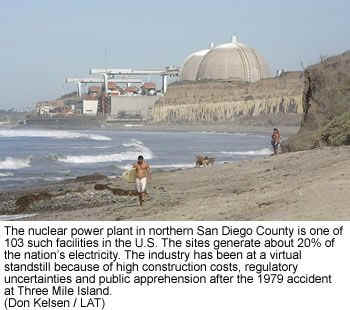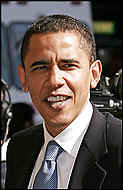 TigerSoft
News Service 2/20/2008 www.tigersoft.com
TigerSoft
News Service 2/20/2008 www.tigersoft.com Wall Street Likes The Idea of A President Obama:
While He May Raise Taxes, He Favors Incentives, Rather Than Mandates.
Bush's Job Approval in Handling The Economy Is Now 14% .
by William Schmidt, Ph.D.
Buy and Hold Is Dangerous See All The Peerless Real-Time Signals: 1981-2008
 |
Tiger
Software
Research on Individual Stocks upon Request: Composite Seasonality Graph
|
Wall Street Likes The Idea of A President Obama:
While He May Raise Taxes, He Favors Incentives, Rather Than Mandates.
Obama says voters wanted a new vision: “It’s a
spirit that says we are looking for something different
— we want something new.” That sounds like what all
politicians say. When we look at his words and short record
we get a bit better idea. Many are concerned that he has too little experience,
seems too cocky on the stump (We
don't want another arrogant President. That model's flaws are all too apparent after
George ("I'm not a nation-builder")
Bush's Presidency.)
Obama seeks to avoid
use of word "mandate" or "require" in Health Care, Pollution
and Emissions and fuel efficiency of cars. Instead,
he seeks to manipulate the market with incentives and
allowing polluters to bid for the right to pollute.
His health care plan has two major weaknesses: it is neither universal, nor cheap.
It would cover only half of the number Clinton's plan would cover and it would cost $4,400
per newly insured person compared to $2,700 in Clinton's plan.
I wonder how many of his
Green supporters know that Obama seems to consider nuclear energy a
clean energy source,
a view which I personally consider abhorrent. But then all the other candidates also
would
give power companies incentives to build more nuclear plants to reduce green-houses
gases... (I used to write
about economic, social and environmental topics for a New Mexico weekly. There I studied closely the
dangers of low-level ionizing radiation. The Federal Government, for example, and
The Bureau of Mines
would not release epidemiological data showing how deadly uranium mining was to uranium
miners in Grants, New Mexico and those down-wind, as far away as Albuquerque.
Now the truth is coming
out. See http://www.ratical.org/radiation/CNR/RIC/NEJM.html
.
http://www.mindfully.org/Nucs/About-Low-Level-Radiation.htm
http://www.ccnr.org/nfb_uranium_biblio.html
http://web.uccs.edu/amilton/student/waste.html
http://www.berkeley.edu/news/media/releases/2007/09/04_GofmanObit.shtml
.
At the center of Obama's message foe change are his claims that he is free of special
lobbyist influence.
To the extent that his contributions are smaller and come from internet appeals, he is
being truthful. But he also gets
big campaign contributions from special interests. "In fact, he's
received so much funding, an estimated $30 million per month, that his campaign appears to
be backpedaling on a November pledge where he said if he was the Democratic nominee, he
would aggressively pursue an agreement with the Republican nominee to preserve a publicly
financed general election. A February 3, article by "The New York Times"
reported that Exelon Corp, the nation's largest nuclear plant operator is one of Obama's
largest campaign donors. According to the article, Exelon's support of Obama far exceeds
money given to the other candidates. The "Times" pointed out that Exelon
chairman John W. Rowe has been an Obama donor and is also chairman of the Nuclear Energy
Institute, the nuclear power industry's largest lobbying group.
The article did not mention that Rowe, like several other powerful energy power players
also sits on the influential, right wing and neo-conservative American Enterprise
Institute's Board.
( http://www.politicalcortex.com/story/2008/2/19/135659/423
)...
 |
Trading One Devil for Another. In the effort to curb green-house gases from coal fired plants, McCain and Liberman have proposed legislation to subsidize the building of huge nuclear power plants. The nuclear power industry in the U.S. has been at a virtual standstill because of high construction costs, regulatory uncertainties and public apprehension after a 1979 accident at Pennsylvania’s Three Mile Island. A number of plants ordered before the accident went into operation. But many more were canceled after one of the Three Mile Island reactors suffered a partial meltdown and small amounts of radiation were released into the atmosphere. |
I liked what Obama said about stopping America's march backwards towards the Social
Darwinism of the
late 19th century, where the poor and weak were considered tools, canon fodder and utterly
expendable. The
Social Darwinist would say "The poor are weak and Nature must be allowed to weed them
out". Compare this
with the 19th century Calvinists, who would say, "Their poverty proves they do not
have God's favor, while
the wealthy, by their good fortune, show that they are blessed with God's providence.
Either way, from what
I can see, the poor do not have to be poor. It is a choice that political and
economic leaders make for them.
He will try to change things that have caused so much out-souring of jobs, obscenely high
executive
pay and unsafe imports. He will try to, he says, move America away from unbridled
selfishness at the top. "Instead of thinking about what's good for America or what's
good for business, a mentality has crept into certain corners of
Washington and the business world that says, 'What's good enough for me is good enough,'
". Obama gives the subprime-mortgage crisis sweeping the country as a
"prime" example. "If we are honest, I think we must admit that
those who have benefited from the new global marketplace - and that includes almost
everyone in this room - have not always concerned themselves with the losers in this new
economy."
In
the words of one of his consultants, "Business would have a seat at the table,
but business wouldn't be able to buy all the chairs." Obama sponsored a bill to
give shareholders a non-bonding proxy vote on executive pay. (My
complaint with Obama is that such limits on excessive CEO pay should be absolutely
binding). Obama voted for a free-trade pact with Peru that contained provisos
to protect the Peruvian environment and Peruvian labor. From
what I have read about Newmont Mining and Peru, I would say this is far-sighted and just!
Obama seems
open. With banker, Rober Wolf, CEO of UBS Americas, he has exchanged views about the
Senate-passed economic stimulus package and the role of the G-7 economic summit. In
between rallies on the campaign trail, Obama has also consulted on the economy with
billionaire Warren Buffett. Obama frequently cites Buffett's
support for rolling back the Bush tax. Most surprising, Obama has also been in touch
with Republican and former
Federal Reserve Chairman Paul Volcker, who has endorsed him. "When I sat down
with him, I found him to be
unbelievably refreshing and smart and thoughtful," says Wolf. The UBS chief has
gone on to raise more than $1 million (690,000 euros) for the Obama campaign.
More details will have to be set out about his plan for a voluntary health care
plan. It is a disgrace that
every other industrialized nation on the planet has a universal and comprehensive health
care system of insurance..
How is this to be paid for? I suppose anything is better than nothing.
But this sounds like only a half step to me.
Paul Krugman in the New York Times agrees with me: "The difference between the plans
could well be the difference between achieving universal health coverage — a key
progressive goal — and falling far short... New estimates say
that a plan resembling Mrs. Clinton’s would cover almost twice as many of those now
uninsured as a plan resembling
Mr. Obama’s — at only slightly higher cost."
|
Obama voted against the Bush tax cuts on capital gains and dividends and against repealing
Estate
Tax cuts. He called it “billions of dollars to billionaire heirs and
heiresses.” Certainly, these cuts have made the rich
very rich, indeed. But Wall Street will not like this. And will probably show
its displeasure and power by promptly
starting a bear market if Obama becomes President.
Energy independence? Obama voted against drilling more off-shore drilling and in the
Alaska wilderness.
He has opposed lifting a $0.54 per gallon tariff on Brazilian ethanol. “Ethanol imports are neither necessary nor a
practical response to current gasoline prices".
Obama's approach to pollution controls is conservative and uses the market place. He would allow
industrial polluters, provided they pay for the right to pollute! The
money raised in his way would be used to
help develop and deploy clean, green energy. $150 billion should be invested in
R&D for "renewable,
biofuels, efficiency, "clean coal," and other clean tech.". He
would subsidize US automakers by having the "Federal Government
help cover the health-care costs of retired US autoworkers.in exchange for domestic auto
companies investing at least 50 percent of the savings into production of more
fuel-efficient vehicles."
Obama
voted against right-wing Supreme Court judges Alito and John Roberts. As I dislike their refusalto allow the FDA the power to control the nicotine in cigarettes, I think Obama voted progressively. Obama
said no to Patriot Act wiretap extensions. I don't like Big Brother. There are much better ways to deter another
terrorist attack on the US. He collaborated in blocking John Bolton’s appointment to the United Nations. John Bolton
does not even believe in the United Nations. He certainly should not be our representative there. He earned a perfect 100 percent rating from NARAL Pro-Choice America. As a man, I will leave this up to the women who bear
children. He opposed the anti-gay Defense of Marriage Act.
|
"These are private decisions by individuals at the firm to contribute, and it would be inappropriate for Goldman Sachs to comment on it," said Peter Rose, a Goldman spokesman. U.S. employees of Zurich-based UBS gave more than $140,000 to Obama, compared with
$62,050 to Giuliani and $9,100 for Clinton. Romney raised $24,100 from UBS employees, and
McCain took in $16,000. |
| General
Election: McCain vs. Obama http://www.washingtonpost.com/wp-dyn/content/article/2007/04/17/AR2007041701688.html
|
|||||||||||||||||||||||||||||||||||||||||||||||||||||||||||||||||||||||||||||||||||||||||||||
| Bush's Job Approval
is now 19% http://americanresearchgroup.com/economy/
When it comes to rating their household financial situations, 59% of Americans give an excellent, very good, or good rating and 40% give a bad, very bad, or terrible rating.
George W. Bush's overall job approval rating has dropped to a new low in American Research Group polling as 78% of Americans say that the national economy is getting worse according to the latest survey from the American Research Group. Among all Americans, 19% approve of the way Bush is handling his job as president and
77% disapprove. When it comes to Bush's handling of the
economy, 14% approve and 79% disapprove.
|
||||||||||||||||||||||||||||||||||||||||||||||||||||||||||||||||||||||||||||||||||||||||||||||||||||||||||||||||||||||||||||||||||||||||||||||||||||||||||||||||||||||||||||||||||||
|
Pro-Big Business McCain.
Populist Obama and Ben Stein Senator John McCain keeps
affirming his no-new-taxes pledge. He has emphasized his plans to cut
|
 Employees of
Goldman, the world's biggest securities firm by market value, donated $120,250 to Obama,
who addressed Goldman's annual partners' meeting in Chicago last year, and $113,750 to
Romney, the filings show. Clinton got $64,400 from the firm's employees. Giuliani received
$13,250.
Employees of
Goldman, the world's biggest securities firm by market value, donated $120,250 to Obama,
who addressed Goldman's annual partners' meeting in Chicago last year, and $113,750 to
Romney, the filings show. Clinton got $64,400 from the firm's employees. Giuliani received
$13,250.